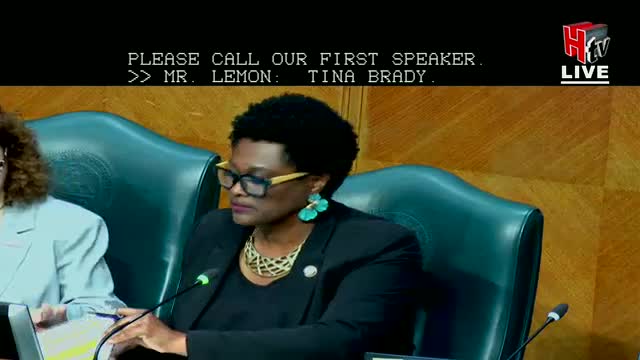Residents and officials clash over Polk Street abandonment tied to GRB expansion; calls to delay vote
Get AI-powered insights, summaries, and transcripts
Subscribe
Summary
Houston City Council heard hours of public comment Oct. 14 as residents, hotel and restaurant officials, and elected leaders debated whether Polk Street should be abandoned to accommodate a planned expansion of the George R. Brown Convention Center.
Hundreds of residents and business representatives addressed the Houston City Council on Oct. 14 as debate intensified over a plan to close (abandon) Polk Street to accommodate the planned George R. Brown Convention Center expansion.
Speakers opposing the Polk Street abandonment said the design process lacked early, meaningful public engagement and asked the council to delay any vote until a comprehensive traffic and community‑impact plan is released. Tina Brady, a resident of Eastwood, told councilors, “They revealed their plans only when seeking approval, presenting the community with a done deal. That's not engagement. It's notification.” Karen Lancaster and other commenters said the Joint Referral Committee (JRC) received more than 230 comments and petition organizers submitted nearly 600 signatures opposing the current design.
Supporters of the GRB expansion — including hotel and restaurant representatives — urged the council to approve the transformation, saying it will boost conventions and local revenue. Charles Watts of the Marriott Houston South at Hobby Airport called the project “a generational investment” and said, “Closing Polk Street is essential. It's a linchpin connecting the new structure to the George R. Brown.” Michael Shine of the Texas Restaurant Association and other hospitality leaders repeated projections about large long‑term economic benefits attributed to the South Building and related developments.
Opponents disputed the project timeline and the adequacy of the economic and traffic analyses presented so far. Speakers cited a TxDOT map they said shows Polk will remain open under TxDOT's reroute, and they urged the council to require an independent feasibility study comparing scenarios that keep Polk open, build over it, or pursue grade separation and bridge alternatives. Amy Demby told the council Houston First had acknowledged that a bridge over Polk is feasible and asked that bridge options be fully explored.
State and local elected officials also submitted concerns. A letter read into the record from state Rep. Jolanda Jones asked the council to delay a vote until a complete traffic and community impact plan — with pedestrian, bicycle, and transit alternatives and updated traffic studies — is publicly released. Sen. Boris Miles and other state leaders urged more public meetings with affected neighborhoods before any abandonment vote.
Council members and staff said engagement has occurred through meetings and briefings but acknowledged residents want more direct, earlier involvement. Council Member Joaquin Martinez said work with TxDOT, Houston First and other stakeholders is ongoing and that East‑West connectivity (including improvements on Leland) remains a priority. Several council members said they would continue to press for additional traffic modeling, grade‑separation studies and community‑led mobility planning prior to any final action.
The council did not record a final vote on Polk Street abandonment during the meeting. Instead, commenters and several council members urged additional study, broader community sessions and either an independent feasibility comparison of options or explicit guarantees (for example, two‑way Leland access or a Polk bridge) before a final decision.
Why it matters: Polk Street is described by opponents as a vital east‑west connector for commuters, emergency services, small businesses and neighborhoods east of downtown. Closing it without a clear, public mitigation plan could shift traffic into residential streets and affect access and equity in historically affected communities.
Next steps: Residents asked the council to postpone any abandonment vote until additional technical studies and formal consultations are completed and publicly released; council members said those conversations would continue with Houston First, TxDOT and community leaders.
